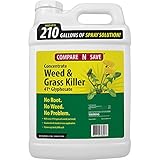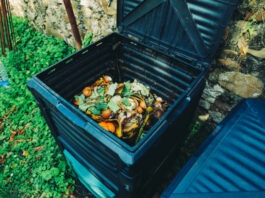Growing herbs in your own garden is a fulfilling and rewarding experience. However, the presence of weeds can make your gardening efforts go in vain. Weeds compete with your herbs for essential nutrients, water, and sunlight, which can result in poor growth and yield. To avoid this, you can use herbicides to control weeds in your herb garden. In this article, we’ll explore the top 5 herbicides for controlling weeds in your herb garden. But before that, let’s discuss how to select the right herbicide.
How to Select the Right Herbicide For My Herbs?
Choosing the right herbicide depends on several factors, including the type of weeds you are trying to control, the location and size of the area, the stage of weed growth, and the surrounding vegetation. Here are some tips to help you select the right one:
- Identify the weeds: The first step in choosing the right herbicide is to identify the weeds you want to control. Different herbicides are effective against different types of weeds, so it’s important to choose a product that targets the specific weed species you’re dealing with.
- Determine the growth stage: Herbicides are most effective when applied during certain stages of weed growth. For example, some herbicides are most effective when applied to young weeds, while others are more effective on mature weeds. Make sure to choose a herbicide that is appropriate for the growth stage of the weeds you want to control.
- Consider the location and surrounding vegetation: Before selecting a herbicide, consider the location of the area you want to treat and the surrounding vegetation. Some herbicides are not safe to use near water sources or on certain types of plants, so it’s important to choose a product that is appropriate for the location and surrounding vegetation.
- Choose the right formulation: Herbicides are available in different formulations, such as liquid, granular, or concentrate. Choose a formulation that is appropriate for the size of the area you want to treat and the method of application.
- Read the label: The herbicide label contains important information about the product, including the active ingredients, application rates, and safety precautions. Make sure to read the label carefully before selecting a herbicide and follow the instructions for use and safety precautions.
By considering these factors and selecting the right herbicide for your specific situation, you can effectively control weeds while minimizing the risk of harm to humans, pets, and the environment.
What Are the Types of Herbicides?
- Glyphosate-based herbicides: Glyphosate-based herbicides such as Roundup are effective at controlling broadleaf weeds and grasses. They are non-selective and work by blocking the production of a specific enzyme that is essential for plant growth.
- Diquat-based herbicides: Diquat-based herbicides such as Reward are selective herbicides that target aquatic weeds. They work by causing rapid dehydration of the plant, leading to its death.
- 2,4-D-based herbicides: 2,4-D-based herbicides such as Weed-B-Gon are selective herbicides that target broadleaf weeds. They work by mimicking the effects of the plant hormone auxin, which causes uncontrolled growth and eventually kills the plant.
- Triclopyr-based herbicides: Triclopyr-based herbicides such as Garlon are selective herbicides that target woody and broadleaf weeds. They work by disrupting the plant’s growth and metabolism, eventually leading to its death.
- Clopyralid-based herbicides: Clopyralid-based herbicides such as Transline are selective herbicides that target certain types of weeds, including clover and thistle. They work by interfering with the plant’s ability to produce certain amino acids, leading to its death.
How to Apply Herbicides Safely and Effectively?
Herbicides are chemicals used to control or eliminate weeds in lawns, gardens, and agricultural fields. While they can be an effective tool in weed management, they can also be harmful to humans, pets, and the environment if not used safely and correctly. Here are some tips on how to apply herbicides safely and effectively:
- Read and follow the label: The label contains important information about the proper use, application rates, and safety precautions for the product. Make sure to read the label thoroughly before using the herbicide and follow the instructions carefully.
- Wear protective clothing and equipment: Herbicides can be toxic if they come into contact with skin, or eyes, or are ingested. Wear protective clothing, such as long-sleeved shirts, pants, gloves, and goggles, to minimize the risk of exposure. If the label recommends a respirator, be sure to wear one that is approved for use with herbicides.
- Apply herbicides during the right weather conditions: Herbicides are most effective when applied during specific weather conditions. Avoid applying herbicides during windy or rainy weather as the product can drift or wash away, potentially harming nearby plants or animals. Apply herbicides on a calm, dry day with moderate temperatures.
- Use the right application technique: The most common application methods for herbicides are spraying, dusting, or applying granules. Choose the method that is appropriate for the product and the situation. Use a calibrated sprayer to ensure proper coverage and avoid over-application.
- Store and dispose of herbicides properly: Store herbicides in their original containers and in a cool, dry place out of the reach of children and pets. Follow the label instructions for disposing of the container and any leftover product. Do not pour unused herbicides down the drain or dispose of them in the trash.
By following these tips, you can safely and effectively apply herbicides to control weeds in your lawn or garden while minimizing the risk of harm to yourself, others, and the environment.
Top 5 Herbicides for Controlling Weeds in Your Herb Garden
- Compare-N-Save 75325 Herbicide, 2.5-gallonLooking for a powerful herbicide that can effectively eliminate unwanted weeds and vegetation from your lawn or garden? Look no further than Compare-N-Save 75325 Herbicide! This high-quality herbicide comes in a convenient 2.5-gallon container and is designed to provide fast, efficient results. Its potent formula is effective against a wide range of common weeds and plants, including dandelions, clover, crabgrass, and more. Easy to use and long-lasting, Compare-N-Save 75325 Herbicide is the perfect solution for anyone looking to keep their outdoor spaces looking beautiful and well-maintained. So why wait? Order yours today and experience the difference for yourself!
- Roundup Super Concentrate Weed & Grass Killer, 1 galIntroducing Roundup Super Concentrate Weed & Grass Killer, the powerful solution to unwanted plants in your garden or lawn. With a potent formula, this 1-gallon concentrate can cover up to 25,000 square feet, effectively killing weeds and grass at the root. Its fast-acting action ensures visible results in just 24 hours, making it the ideal choice for busy gardeners. The convenient measuring cup ensures accurate dilution, while the easy-to-use spray bottle ensures precise application. Say goodbye to stubborn weeds and grass with Roundup Super Concentrate Weed & Grass Killer, the ultimate solution for a weed-free landscape.
- Southern Ag Crossbow Specialty Herbicide Low Volatile Weed & Brush Herbicide, 128oz - GallonSouthern Ag Crossbow Specialty Herbicide is a powerful low-volatile weed and brush herbicide designed to effectively eliminate unwanted vegetation. Its unique formula is specially designed to control a broad range of tough weeds and woody plants, making it an essential tool for homeowners, farmers, and land managers. This 128oz gallon size is perfect for larger jobs and offers long-lasting control that won't harm desirable plants. With Southern Ag Crossbow, you can be confident in achieving the results you want without damaging the environment. Get ready to take control of your property and eliminate unwanted vegetation with Southern Ag Crossbow Specialty Herbicide.
- Dow AgroScience PastureGard HL Herbicide, Triclopyr and Fluroxypyr Herbicides for Broadleaf and Woody Plant Control, 1 GallonIntroducing Dow AgroScience PastureGard HL Herbicide, the ultimate solution for broadleaf and woody plant control. This powerful herbicide is specially formulated with a blend of triclopyr and fluroxypyr herbicides to provide excellent control of brush, thistle, and other noxious weeds. With a single gallon of this concentrated formula, you can easily treat up to 10 acres of land. The easy-to-use design and high-quality ingredients make this herbicide the perfect choice for farmers, ranchers, and other agricultural professionals. Say goodbye to unwanted plant growth and enjoy a healthier pasture with Dow AgroScience PastureGard HL Herbicide.
- Crystal Blue Tsunami DQ Aquatic Herbicide- Gallon - 37.3 Percent Diquat DibromideIntroducing the Crystal Blue Tsunami DQ Aquatic Herbicide - the ultimate solution for aquatic weed control in lakes and ponds! This concentrated herbicide packs a powerful punch with 37.3% diquat dibromide, effectively eliminating a wide range of pesky weeds such as duckweed, watermeal, curly leaf, pondweed, and more. Perfect for use in both residential and commercial settings, this gallon-sized herbicide is designed to provide long-lasting results with minimal effort. Say goodbye to unsightly and invasive aquatic weeds and hello to crystal clear waters with Crystal Blue Tsunami DQ Aquatic Herbicide!
What are the Alternative Weed Control Methods?
While herbicides can be an effective tool for weed control, they are not the only option. There are several alternative weed control methods that can be used to manage weeds in a safe and environmentally-friendly way. Here are some examples:
- Hand weeding: This is the oldest and most traditional method of weed control. It involves physically pulling the weeds out of the ground by hand, which can be labor-intensive but effective.
- Mulching: Applying a layer of organic material, such as straw, leaves, or wood chips, over the soil can prevent weed growth by blocking sunlight and suppressing weed germination.
- Cultivation: Using a hoe or cultivator to break up the soil and disturb weed roots can be an effective way to control weeds, especially in vegetable gardens and other small areas.
- Solarization: This method involves covering the soil with clear plastic to trap heat and solarize the weeds. This can be an effective way to kill weed seeds and roots without using herbicides.
- Flame weeding: Using a propane torch to burn the weeds can be an effective method for controlling weeds in areas where herbicides cannot be used, such as near water sources or in organic gardens.
- Biological control: This method involves introducing natural predators, such as insects or fungi, to control the weed population. This method can be effective but requires careful research and planning to avoid unintended consequences.
By using these alternative weed control methods, you can effectively manage weeds without relying on herbicides, reducing the risk of harm to humans, pets, and the environment.
Conclusion
In conclusion, using herbicides can be an effective way to control weeds in your herb garden. Remember to select the right herbicide based on your needs and consider its safety for your herbs and the environment. Additionally, follow the instructions carefully and take the necessary precautions while applying herbicides. If you’re not comfortable using herbicides, try alternative weed control methods such as hand-pulling, companion planting, or mulching. With these tips, you can enjoy a weed-free herb garden and reap the benefits of fresh, flavorful herbs in your cooking.
Don’t let weeds take over your herb garden and hinder your gardening efforts. With the right herbicides and proper application, you can effectively control weeds and ensure the healthy growth of your herbs. However, it’s important to remember that they can have harmful effects on the environment and should be used with caution. Always follow the instructions provided by the manufacturer and dispose of herbicides properly.
Alternative weed control methods such as hand-pulling, companion planting, and mulching can also be effective in controlling weeds in your herb garden without the use of herbicides. Experiment with different methods and see what works best for your garden and gardening style.
We hope this article has been informative and helpful in choosing the right herbicide for your herb garden. Remember to always prioritize safety and environmental responsibility in your gardening practices. Happy gardening!
You can also check:
Last update on 2023-04-18 / Affiliate links / Images from Amazon Product Advertising API









